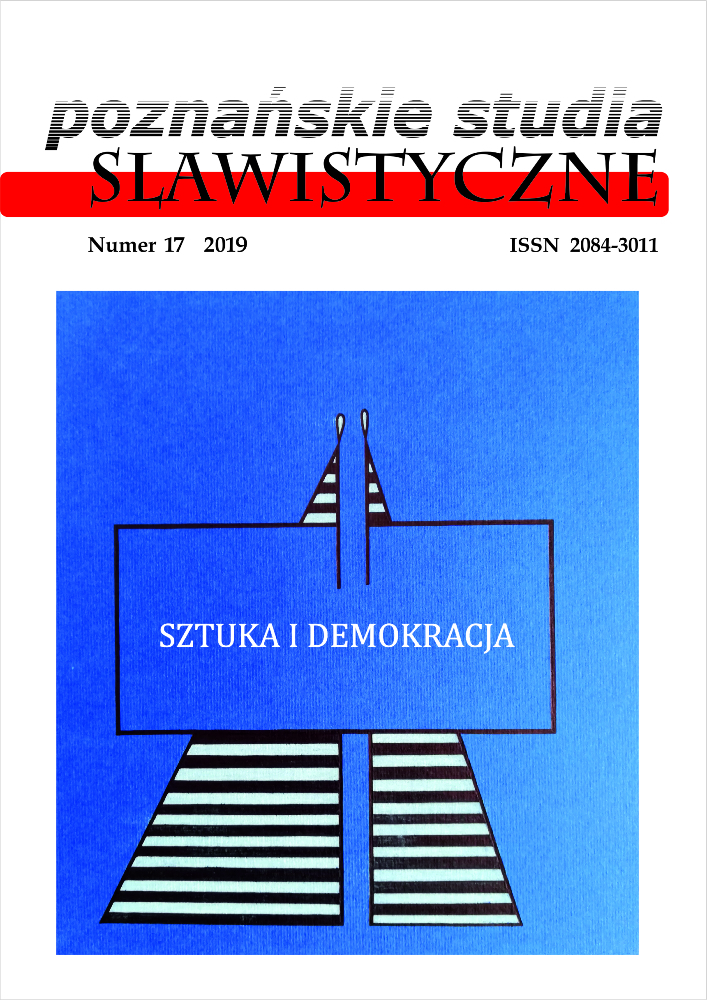Abstract
The article deals with the analysis of the relationship between art, literature, and democracy, starting with the interpretation of Deleuzeʼs reading of D.H. Lawrence, Apocalypse. It is shown that in the contemporary world we are faced with a radical turn of knowledge, values and ways of thinking. Instead of the word prophecy, the act becomes a vision of transparency that has its most powerful means in the logic of mass media interaction. Hence the image that precedes the world has the potential for transforming the idea of the Book into a post-apocalyptic era of visualization of objects. With the help of Deleuzeʼs concepts such as multitude, difference and becoming, the article focuses on the criticism of the democratic emptiness of the world from which the secret has disappeared, and there has been only writing for survivors, the Book for Zombies. Is this a metaphysical testament at the time when writing has nothing more to do with the reference framework of modern art, when a change in the society could still set goals and tasks?References
Benjamin, W. (1991). Zur Kritik der Gewalt. "Gesammelte Schriften" sv. II, 1.
Debord, G. (1996). La société du spectacle. Paris: Gallimard.
Deleuze, G. (1968). Différence et Répétition. Paris: P.U.F.
Deleuze, G. (1990). Post-scriptum sur le sociétés de contrôle. "LʼAutre journal" br. 1, svibanj. https://sites.google.com/site/deleuzemedia/textes/post-scriptum-sur-les-societes-de-controle. 20.12.2018.
Deleuze, G. (1993). Critique et Clinique. Paris: Ed. de Minuit.
Deleuze, G. (2014). Proust et le signes. Paris: P.U.F. https://doi.org/10.3917/puf.deleu.2014.01
Deleuze, G., Guattari, F. (1975). Kafka. Pour une littérature mineure. Paris: Ed. de Minuit.
Derrida, J. (1972). La Dissémination. Paris: Ed. Seuil.
Derrida, J. (1983). Dʼun ton apocalyptique adopté nagueré en philosophie. Paris: Galilée.
Freud, S. (2010). Pojam jeze u književnosti i psihologiji. Prev. D. Tkalec. Zagreb: Scarabeus Naklada.
Lawrence, G. H. (2002). Apocalypse. Préface de G. Deleuze. Paris: Desjonquères.
Lyotard, J. F. (1983). Le différend. Paris: Ed. de Minuit.
Ortega y Gasset, J. (2007). Dehumanizacija umjetnosti. Prev. M. Grčić. Zagreb: Litteris.
Paić, Ž. (2006). Slika bez svijeta: Ikonoklazam suvremene umjetnosti. Zagreb: Litteris.
Paić, Ž. (2013). Sloboda bez moći: Politika u mreži entropije. Zagreb: Bijeli val.
Paić, Ž. (2014). Treća zemlja: Tehnosfera i umjetnost. Zagreb: Litteris.
Paić, Ž. (2017). Doba oligarhije: Od informacijske ekonomije do politike događaja. Zagreb: Litteris.
Paić, Ž. (2018a). Tehnosfera 2: "Crna kutija" metafizike - Kibernetika i apsolutno vrijeme stroja. Zagreb: Sandorf i Mizantrop.
Paić, Ž. (2018b). Anđeo povijesti i Mesija događaja: Umjetnost-Politika-Tehnika u djelu Waltera Benjamina. Beograd: FMK.
Rancière, J. (2000). Le Partage du sensible: Esthétique et politique. Paris: La Fabrique edition. https://doi.org/10.3917/lafab.ranci.2000.01
Williams, J. (2011). Gilles Deleuze's Philosophy of Time: A Critical Introduction and Guide. Edinburg: Edinburgh University Press.
Wittgenstein, L. (1972). Philosophische Grammatik. Frankfurt a. M: Suhrkamp.
License

This work is licensed under a Creative Commons Attribution-NoDerivatives 4.0 International License.

